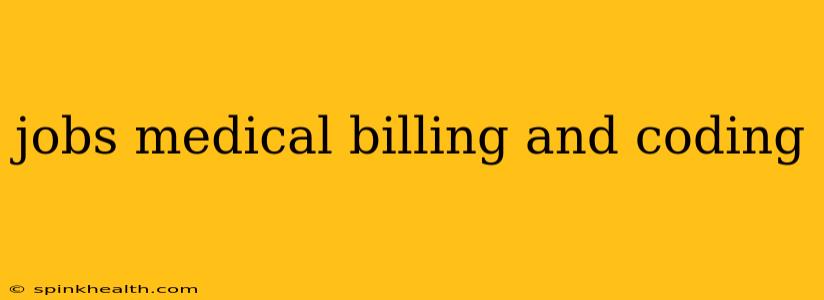The world of healthcare is vast, complex, and constantly evolving. Behind the scenes, ensuring the smooth flow of financial transactions and accurate patient records are the unsung heroes: medical billers and coders. These professionals play a vital role in the healthcare ecosystem, and the demand for skilled individuals in these fields is consistently high. But what exactly do these jobs entail, and what's the path to landing your dream role in medical billing and coding? Let's unravel the mystery.
Imagine this: a patient receives treatment at a hospital. Doctors, nurses, and technicians provide care, but someone needs to translate that care into a clear, concise, and accurate bill. That's where medical billers and coders step in. They are the interpreters between medical services and insurance companies, ensuring providers get paid for their work while patients understand their financial responsibilities.
What Does a Medical Biller Do?
Medical billers are the financial navigators of the healthcare system. Their primary role is to ensure healthcare providers receive payment for services rendered. This involves a multifaceted process, including:
- Creating and submitting claims: They prepare and send insurance claims, ensuring all necessary information is accurately included and formatted correctly. This requires attention to detail and a deep understanding of various insurance regulations and payer requirements.
- Following up on claims: Not all claims are processed smoothly. Billers diligently track claims, investigate denials, and resolve issues with insurance companies to ensure timely payment.
- Managing patient accounts: They maintain accurate patient records, communicate with patients about outstanding balances, and handle payment arrangements.
- Reconciling accounts: This involves comparing the amount billed to the amount paid, identifying discrepancies, and resolving any outstanding issues.
What Does a Medical Coder Do?
Medical coders are the linguistic experts of the healthcare world. They translate medical diagnoses, procedures, and services into numerical codes using standardized coding systems like ICD-10-CM (International Classification of Diseases, Tenth Revision, Clinical Modification) and CPT (Current Procedural Terminology). These codes are crucial for accurate billing and medical record-keeping. Their responsibilities include:
- Reviewing medical records: Coders carefully examine patient charts, physician notes, and other medical documentation to extract the necessary information for coding.
- Assigning codes: They apply the appropriate ICD-10-CM and CPT codes based on the documented services and diagnoses. This requires a deep understanding of medical terminology and coding guidelines.
- Ensuring code accuracy: Maintaining accuracy is paramount to prevent billing errors and ensure compliance with regulations.
- Maintaining coding compliance: Medical coding is a heavily regulated field, and coders must stay up-to-date with the latest coding guidelines and regulations to avoid penalties.
What are the educational requirements for Medical Billing and Coding jobs?
Many enter the field with a formal education like an associate degree in medical billing and coding. However, certificate programs are also a viable option, providing focused training in a shorter timeframe.
What certifications are available?
Several professional organizations offer certifications to demonstrate competence and enhance job prospects. Examples include the Certified Professional Coder (CPC) and Certified Billing and Coding Specialist (CBCS).
What is the job outlook for Medical Billing and Coding?
The Bureau of Labor Statistics projects strong growth for medical billing and coding jobs in the coming years. The increasing demand for healthcare services, coupled with the complexity of insurance billing, ensures a consistent need for skilled professionals in these areas.
What are the salary expectations for Medical Billing and Coding professionals?
Salaries vary based on experience, location, and certification. However, entry-level positions generally offer competitive starting salaries, with the potential for significant growth as experience and expertise increase.
What skills are necessary for Medical Billing and Coding jobs?
Beyond technical skills in coding and billing, success in these fields requires:
- Strong attention to detail: Accuracy is critical in medical billing and coding.
- Excellent communication skills: Interacting with patients, physicians, and insurance companies effectively is essential.
- Analytical skills: Analyzing medical records and identifying relevant information requires strong analytical abilities.
- Problem-solving skills: Resolving billing issues and addressing insurance denials requires effective problem-solving skills.
- Knowledge of medical terminology: A solid understanding of medical terminology is fundamental.
Is a medical billing and coding career right for me?
If you possess a strong attention to detail, enjoy working with numbers, and are interested in the healthcare field, a career in medical billing and coding could be a perfect fit. The field offers a stable job market, good earning potential, and the satisfaction of playing a crucial role in the healthcare system. The path to becoming a successful medical biller or coder involves dedication, continuous learning, and a commitment to accuracy. It's a career that's both challenging and rewarding, offering a unique blend of precision, problem-solving, and the opportunity to make a real difference in people's lives.

